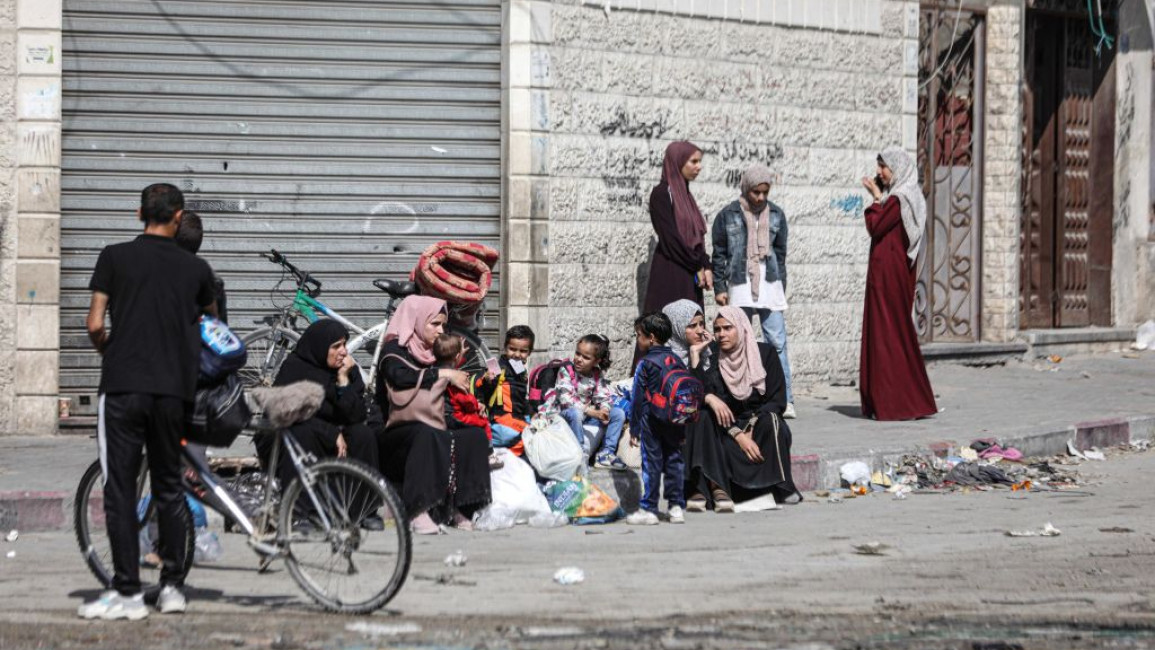Moaz Hassan is forced to visit three markets in Gaza City every day to look for food for his eight-member family, who has been suffering from starvation for many days.
“Searching for something to eat in Gaza has become like searching for a needle in a haystack; no food, no vegetables, and no fruits,” the 45-year-old father of five, remarked to The New Arab while wandering around a popular market in the Al-Sahaba area in central Gaza Strip.
“The markets are almost empty, and if you find any kind of canned food or vegetables, its price will be very expensive,” said the middle-aged man.
Basic vegetables such as tomatoes, greens, onions, and peppers are priced at more than US$ 70 if they are found in the market.
In front of a small shop in the same market, Jamila Al-Khalidi stood looking at several bags where a seller has displayed a batch of legumes. “Lentils, which are not a main meal, have become very expensive. There are no vegetables, meat, or poultry. There is nothing that can be bought,” the 54-year-old mother of six said to TNA.
“For a while, my sons, and daughters have wanted to eat chicken, but there is nothing I can do. I will cook lentils for them, and they will eat them with bread. Today we can buy it, but we do not know if we will be able to do so tomorrow,” she added.
The United Nations Children’s Fund (UNICEF) said in a report that nine out of ten children suffer from severe food poverty, with many of them spending entire days without food.
In northern Gaza, home to more than 700,000 people and experiencing significant lack of basic food supplies, Ahmed Olwan, a local merchant, resorted to selling nutritional supplements and industrial protein to people.
“I got my goods from the gym owners in Gaza who decided to sell them instead of food as the people here cannot find their needed food supplies,” the 25-year-old young man said to TNA.
“Even though such supplies can compensate the body for its needs, but it cannot make us feel full […] Unfortunately, we have been starving for more than two weeks,” he added.
On 7 May 2023, the Israeli army began a military operation in Rafah and took control of the Rafah land crossing, the main crossing with Egypt for the entry of international aid to the northern Gaza Strip was disrupted.
International aid planes have also stopped airdropping aid in areas in the northern Gaza Strip, without providing further details.
RELATED
Israel’s starvation of Gaza ‘same’ as tactics used in Syria
MENA
Sally Ibrahim
William Christou
The government media office in Gaza said that 3,500 children are at risk of death due to malnutrition and lack of food, while 33 children have died from starvation so far.
The media office noted that Israel and the US administration are using aid and food as “a tool for political pressure to repel civilians in the Gaza Strip and are deliberately perpetuating famine and exacerbating the humanitarian situation.”
The media office added that the Palestinians are living in “harsh humanitarian conditions and real famine, especially in the Gaza and northern governorates.”
The office described the continued prevention of the entry of aid into the Gaza Strip as a “crime” as markets and shops suffer from a shortage of goods and commodities due to Israel’s restrictions after its complete closure of all crossings.
Israel’s war on Gaza has killed more than 37,000 people since last October.


